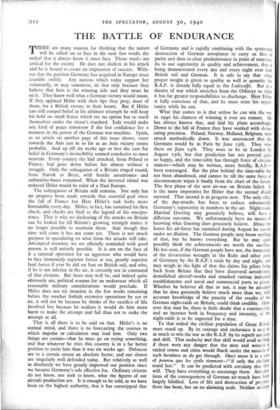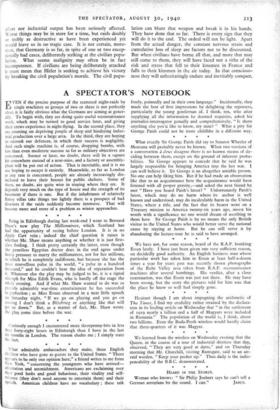THE BATTLE OF ENDURANCE
THERE are many reasons for thinking that the nation will be called on to face in the next few weeks the ordeal that it always knew it must face. Those weeks are critical for the enemy. He dare not slacken in his attack and he is bound to create an impression of success. With- out that the position Germany has acquired in Europe must crumble swiftly. Any nations which today support her voluntarily, or may tomorrow, do that only because they believe that hers is the winning side and they must be on it. They know well what a German victory would mean. If they applaud Hitler with their lips they pray, most of them, for a British victory in their hearts. But if Hitler can still compel belief in his ultimate triumph he will keep his hold on small States which see no option but to enrol themselves under the victor's standard. Italy would make any kind of peace tomorrow if she lost confidence for a moment in the power of the German war-machine. Spain, as an article on another page of this issue shows, veers towards the Axis just in so far as an Axis victory seems probable. And up till six weeks ago or less the case for belief in Germany's invincibility seemed conclusive to most neutrals. Every country she had attacked, from Poland to France, had gone down before her almost without a struggle. Only the subjugation of a Britain ringed round, from Narvik to Brest, with hostile aerodromes and submarine-bases remained. When the invested island was reduced Hitler would be ruler of a Nazi Europe.
The subjugation of Britain still remains. Not only has no progress been made towards that essential goal since the fall of France but Herr Hitler's task looks more formidable every day. Hitler, in fact, has sustained his first check, and checks are fatal to the legend of his omnipo- tence. That is why no slackening of the attacks on Britain can be looked for till Britain's growing strength makes it no longer possible to maintain them. And though that time will come it has not come yet. There is not much purpose in speculating on what form the attacks will take. Attempted invasion, we are officially reminded with good reason, is still entirely possible. It is not on the face of it a rational operation for an aggressor who would have to face immensely superior forces at sea, greatly superior land forces if ever he did set foot on British soil, and who, if he is not inferior in the air, is certainly not in command of that element. But there may well be, and indeed quite obviously are, political reasons for an endeavour which all reasonable military considerations would preclude. If Hitler does not try invasion in the few weeks remaining before the weather forbids extensive operations by sea or air, it will not be because he thinks of the sacrifice of life involved but because he realises it would do him more harm to make the attempt and fail than not to make the attempt at all.
That is all there is to be said on that. Hitler's is no normal mind, and there is no forecasting the courses to which impulse or calculation may lead him. Only two things are certain—that he must go on trying something, and that whatever he tries this country is in a far better position to resist him than it was six weeks ago. Defences are to a certain extent an absolute factor, and our shores are singularly well defended today. But relatively as well as absolutely we have greatly improved our position since we became Germany's sole effective foe. Ordinary citizens do not know, nor seek to know, what the figures of our aircraft production are. It is enough to be told, as we have been on the highest authority, that it has outstripped that of Germany and is rapidly combining with the systematic destruction of German aeroplanes to carry us first to parity and then to clear predominance in point of numbers. As to our superiority in quality and achievement, that is being demonstrated every day and every night over both British soil and German. It is safe to say that when proper weight is given to quality as well as quantity the R.A.F. is already fully equal to the Luftwaffe. But in a theatre of war which stretches from the Orkneys to Aden it has far greater responsibilities to discharge. Herr Hitler is fully conscious of that, and he must seize his oppor- tunity while he can.
What that comes to is that unless he can win the war in 1940 his chances of winning it ever are remote. He has always known that, and laid his plans accordingly. Down to the fall of France they have worked with devas- rating precision. Poland, Norway, Holland, Belgium, were struck methodically down. It was announced that the Germans would be in Paris by June i5th. They were there on June 14th. They were to be in London by August 15th, but that prediction has not proved quite so happy, and the time-table has through force of circum- stances—which may be written, more briefly, R.A.F.- been rearranged. But the plan behind the time-table has not been abandoned, and cannot be till the same force of circumstances wipes it finally from the chart of the future. The first phase of the new air-war on Britain failed. It is the more imperative for Hitler that the second should succeed. That second is in progress now. The only effect of the day-attacks has been to reduce substantially Germany's superiority in numbers in the air. Night-raids, Marshal Goering may genuinely believe, will have a different outcome. We unfortunately have no means of knowing what Goering does genuinely believe. About the losses his air-force has sustained during August he can be under no illusion. The German people may know nothing of that, but he knows everything. But he may quite possibly think the achievements are worth the sacrifice. He has seen, if the German people have not, the immensity of the devastation wrought in the Ruhr and other parts of Germany by the R.A.F.'s raids by day and night, and may weigh in the light of that the claims his pilots bring back from Britain that they have destroyed aerodromes, demolished aircraft-works and smashed various industrial establishments and naval and commercial ports to pieces. Whether he believes all that or not, it may be assumed that he does genuinely believe much more than we, with accurate knowledge of the paucity of the results of the German night-raids on Britain, could think credible. How- ever that may be, there is little doubt that a continuation, and an increase both in frequency and intensity, of the night-raids is to be expected for a time.
To that ordeal the civilian population of Great Britain must stand up. By its courage and endurance it nr y do as much to win the war as the R.A.F. by its superb audacity and skill. That audacity and that skill would avail richlog if there were any danger that the men and women 10 raided towns and cities would flinch under the assaults of such bombers as do get through. Once more it is a case of pourvu que les civils tiennent—" if only the civ'llans stand fast." It can be predicted with certainty that they will. They have everything to encourage them. Ant1/442- Lions of the consequences of German air-attack have b:en largely falsified. Loss of life and destruction of prePertY there has been, but on no alarming scale. Neither mi:itarY effort nor industrial output has been seriously affected. Worse things may be in store for a time, but raids doubly or trebly as destructive as have been experienced yet would leave us in no tragic case. It is not certain, more- over, that Germany is so far, in spite of one or two excep- tionally bad cases, deliberately striking at the civilian popu- lation. What seems malignity may often be in fact incompetence. If civilians are being deliberately attacked it must mean that Hitler is seeking to achieve his victory by breaking the civil population's morale. The civil popu- lation can blunt that weapon and break it in his hands. They have done that so far. There is every sign that they will do it to the end. The ordeal will not be light. Apart from the actual danger, the constant nervous strain and cumulative loss of sleep are factors not to be discounted. But when civilians have borne all that, and more that may still come to them, they will have faced not a tithe of the risk and stress that fell to their kinsmen in France and falls to their kinsmen in the air today. In that conscious- ness they will unhesitatingly endure and inevitably conquer.



























 Previous page
Previous page